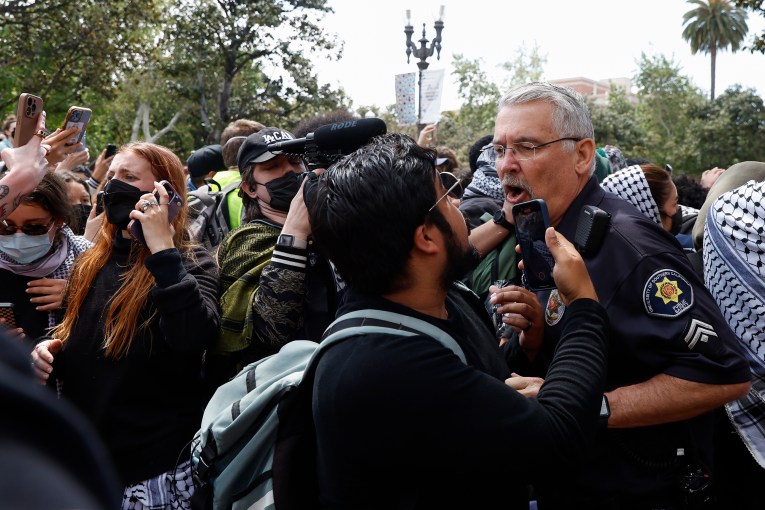It could still be more than a year until major COVID rules are eased around Australia, with major questions about the effectiveness of vaccines and the speed of their rollout to make decisions “tricky” for authorities looking to wind back restrictions.
Chief medical officer Professor Paul Kelly said on Sunday that health authorities were still not sure exactly how effective Australia’s key vaccine would be, and were waiting for data on what effect it would have on transmission and severity of the virus.
2021 ‘tricky’ for authorities
Prime Minister Scott Morrison has warned that vaccination was not a “silver bullet” to erase coronavirus risk, explaining that Australia would have to take a “COVID-safe” approach to 2021.

Infectious diseases expert Professor Peter Collignon. Photo: AAP
Professor Peter Collignon said governments would have to wait to see how vaccines worked, and what happens in the next winter danger period, before lifting rules.
That means border closures, hotel quarantine and indoor venue capacity limits could be in place until March 2022 or later.
“It won’t be before the end of the year, and then it depends on whether you have a view to eliminating the virus, or suppression to low levels,” Professor Collignon, an infectious diseases expert at the Australian National University Medical School, told The New Daily.
“If it’s elimination, it might be two years before you take these down.”
Last week, Mr Morrison and Health Minister Greg Hunt outlined Australia’s vaccination roadmap.
From “mid to late February”, the first of five vaccine “phases” will begin, looking to inoculate 678,000 people including health and quarantine workers, and those in aged care.
Mr Morrison said the government hopes to vaccinate four million people nationwide by April, while October has been pegged as the date for all Australians to have had their jab.

Greg Hunt announces the vaccine strategy. Photo: AAP
Many had hoped widely available vaccines would return Australia to pre-COVID conditions.
But authorities said the effectiveness and public take-up of vaccines would play a big part in how quickly restrictions would be able to be removed.
“For decision makers, 2021 will be very tricky because you’ll have partial vaccine rollout, but we’ll still need to maintain COVID-safe,” NSW Premier Gladys Berejiklian said on Sunday.
“What does the impact of the vaccine rollout mean? What does the impact of restrictions mean? And also what other states do impacts us as well … we want people to feel more optimistic about 2021.”
But it could be even longer than that before life returns to normal.
Expert ‘won’t feel confident’ until March 2022
Professor Collignon, a former World Health Organisation adviser, said it was too early to predict when major COVID restrictions would ease, or when pre-pandemic staples like large entertainment events could return to normal.
“People need to be careful. It won’t go back to normal instantly,” he told TND.
“We’ll have to do COVID-safe activities until the end of this year or longer.”

High-risk people will be the first vaccinated. Photo: Department of Health
He added that Australian governments may need to actually reinstall further rules as we approach winter, and the danger period for the virus – when more people are inside, and when the virus can survive longer in cooler temperatures.
“We’ll need to keep rules until at least October this year. Only one-quarter of people will be vaccinated by winter, so three-quarters will be still susceptible, albeit at hopefully a lower death rate,” Professor Collignon said.
“But it can still spread widely. In winter, it spreads more.
“I think it would be very unlikely we’d be able to relax COVID rules for restaurants and bars until October.”
Professor Collignon said hotel quarantine, the “four-square-metre rule” and restrictions on large gatherings were likely to stay for the foreseeable future.
He added that Australia’s main risk of virus spread – leaks from hotel quarantine – would remain until large nations overseas got through their vaccine programs.

Vaccinations will begin in February, the PM said. Photo: AAP
“It won’t be until the end of the next northern winter, March next year, that we’ll have a good idea how it’s going,” Professor Collignon said.
“The data we need to answer these questions will gradually evolve, but I won’t feel confident until we see what happens in the next northern hemisphere winter.”
PM Morrison echoed similar thoughts last week.
“Once the vaccination starts, COVID-safe practices do not end. They continue,” he said.
“It will still be a fight over the course of 2021.”
Health officials wait on vaccine effectiveness data
Australia has secured 10 million doses of the Pfizer vaccine, which has shown a 95 per cent effectiveness rate.
But the Oxford University and AstraZeneca is the larger part of Australia’s vaccine program, with more than 50 million doses to be produced here by manufacturer CSL.

Large events may not be back on the cards for a while. Photo: ABC
The AstraZeneca vaccine, according to one December study in The Lancet medical journal, had a 62 per cent efficacy among people given two standard doses.
An efficacy of 90 per cent was recorded in a smaller group, who were given one small dose and one standard dose.
Professor Kelly said that study was “interim data” and said Australian authorities were waiting on more robust analysis from AstraZeneca before making decisions on our dosing regime and how effective it would be.
“In terms of its effectiveness, we have interim phase results that were published in December … but what the regulators will get is a much more fulsome set of data from AstraZeneca,” Professor Kelly told TND at a Canberra press conference on Sunday.
“People should be very wary about making decisions or suggestions about that particular vaccine as being less effective on the basis of interim data from one study. I think we should wait for the regulator to do their full work.”
Professor Raina MacIntyre, head of the biosecurity program at the Kirby Institute at the University of NSW, said last week the AstraZeneca vaccine may protect “against death and hospitalisation, but may not protect well against infection”.
“I do not believe the AstraZeneca vaccine based on published phase 3 trial results, will be efficacious enough for herd immunity,” she said.
Professor Kelly said it “remains to be seen” whether Australians would receive two full doses, or one half and one full dose, and anticipated the Therapeutic Goods Administration would make final decisions on AstraZeneca in February.









